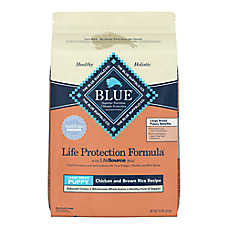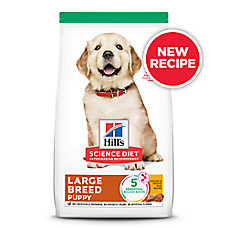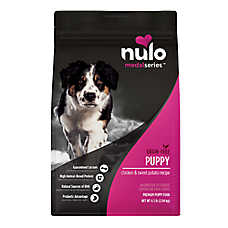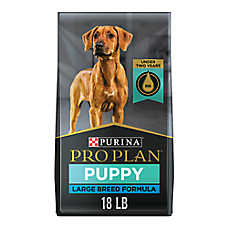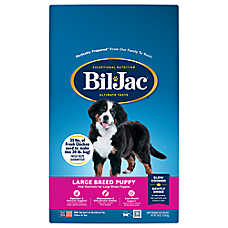4 Tips for Choosing the Best Puppy Food

Before you bring home your new puppy, you should choose a food that’s right for them. Perhaps choosing the best puppy food doesn’t seem like a task that should require much thought, but there are a few things to consider before you purchase puppy food. As a pet parent, you want to provide the absolute best nutrition for your pup, and that means feeding them food that is appropriate for their age, size, breed, and dietary needs.
Bringing Your Puppy Home
When you first bring your puppy home, you’ll want to ask what they’re used to eating. Abruptly switching foods can cause stomach upset, vomiting and/or diarrhea, so it’s a good idea to offer your new dog the same food they’re used to in order to avoid upsetting their stomach for the first several days. If you decide to transition to a different puppy food later, you can do so gradually by mixing the new food with the old food, eventually phasing out the old food.
Choosing the Right Food
Wet or dry dog food? Grain-free or with-grain? There are so many options! But which is best for your puppy? If you’re not sure where to begin, check out these 4 tips for choosing the best puppy food.
Make Sure That It’s Puppy Food
First things first, you’ll need to narrow your search to only include foods that are made specifically for puppies. Puppies need food that contains a higher amount of calories per cup and one that is formulated to be nutritionally complete for a growing puppy’s needs. To find out if a certain food is specially formulated for puppies, simply read the label, as it will clearly indicate that it is puppy food.
Food Size Matters
To ensure that your four legged friend can eat their food safely, you should check to make sure the actual size of the kibble (or food chunks in wet dog food) is appropriate for your puppy. A toy poodle or tiny yorkie would have a difficult time eating the same food as a Great Dane puppy, for example.
Specialized Puppy Food
If your puppy has been diagnosed by a veterinarian with a food allergy or sensitivity or other health concern, you might need to switch them to specialized puppy food that suits their individual health consideration. From grain-free to gluten-free, there are a variety of specialized puppy food options. Your vet might even recommend a therapeutic diet for your canine companion. If your puppy needs a specific type of food, you should work with your vet to find the best option for your four-legged friend.
Switching to Adult Food
Wondering if it’s time to switch over to adult dog food? Unfortunately, there’s not a one-size-fits-all answer to this question. According to an article published by the Cummings Veterinary Medical Center at Tufts University, you can transition most smaller breed dogs, as well as large dog breeds, to an adult dog food once they are 1 year of age as they should be mostly finished growing, as long as your vet has determined that they are at a healthy weight. However, for giant breeds (think Great Danes, Mastiffs, Great Pyrenees, etc), the growth period can last for up to 18 months and beyond. Those dogs may need the extra nutrients for longer, so switching them to an adult dog food may need to wait for a few more months. It’s important consult with your veterinarian about the best time to switch your dog’s food from puppy food to adult food.
Choosing the best puppy food can be difficult, but the best place to start is your pet’s veterinarian. Your vet can recommend the best puppy food for your cuddly new pup so you can rest assured that they’re getting the right nutrients to grow into a healthy, happy adult dog.
Information in this article is not intended to diagnose, treat or cure your pet and is not a substitute for veterinary care provided by a licensed veterinarian. For any medical or health-related advice concerning the care and treatment of your pet, contact your veterinarian.
FAQs
When should I switch my puppy to adult food?
Most dogs are ready to switch to adult food around 12 months old, but it depends on their breed and size. Large and giant breed dogs often stay on puppy food longer. Your vet can help you decide when it's time to transition.
Can I feed my puppy adult dog food?
It’s best to stick with food made specifically for puppies. Puppy food supports growth with the right balance of nutrients and calories. Adult food may not meet your puppy’s needs during this critical stage.
What’s the difference between puppy food and adult food?
Puppy food is higher in calories, protein, and essential nutrients to fuel healthy development. Adult food is formulated to support long-term health once your dog’s growth slows down.
Does breed size matter when choosing puppy food?
Yes. Puppies of different sizes have different nutritional needs. Look for food labeled for small, average, or large breed puppies so your dog gets the right mix of nutrients and energy.
How do I switch my puppy to a new food?
Start slow. Mix a small amount of the new food with their current food, gradually increasing the ratio over 7 to 10 days. This helps avoid tummy troubles and lets your puppy adjust to the new flavor and formula.
Can I feed my puppy a mix of wet and dry food?
Yes, you can. Mixing wet and dry food gives your puppy variety in texture and taste. Just be sure to adjust portions so they’re not overeating, and stick with products made for puppies.
How often should I feed my puppy?
Young puppies typically eat three to four times a day. As your pup grows, you can gradually shift to two meals a day. Your vet can help you set a schedule based on your puppy’s age and breed.
What should I do if my puppy has a sensitive stomach?
If your puppy shows signs of digestive discomfort, ask your vet about switching to a food made for sensitive stomachs. Look for formulas with easily digestible ingredients and avoid sudden food changes.
